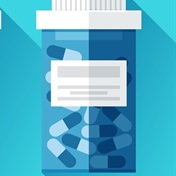
Many doctors feel frustrated by patients who don't follow their instructions and take their medications as prescribed.
But now, pairing medication with an ingestible sensor can help clinicians track how often and when patients actually take their prescription drugs, according to a small new investigational study.
A special configuration
The findings come on the heels of the US Food and Drug Administration's decision last month to approve the first digital pill for use with the antipsychotic drug Abilify, often prescribed to treat schizophrenia, bipolar disorder and depression.
The new research involved just 15 patients, all of whom had been prescribed the opioid pain drug oxycodone (OxyContin) after sustaining a fracture.
The findings were published in the journal Anesthesia & Analgesia.
The study participants were given a special configuration of oxycodone. The pain med was packaged together with a so-called "digital pill". This meant that each time a patient took the pain med, they ingested a gelatine capsule that contained the oxycodone as well as a radiofrequency emitter.
The emitter was automatically activated when the capsule was swallowed. It sent signals to a sticky patch placed on the person's abdomen. That, in turn, conveyed basic pill-taking information to an iPod-sized reader.
Changes in medication-taking behaviour
There are however fears that this kind of system could be regarded as a "biomedical Big Brother" and if used improperly, could foster mistrust.
The system enabled researchers to track how many pills the 15 patients actually took, rather than the number of pills they'd been given.
On average, the patients took just six pills in total – even though they had been provided a supply of 21 pills, according to the report.
"As an investigational tool, the digital pill provides a direct measure of opioid ingestion and changes in medication-taking behaviour," senior author Dr Edward Boyer said in a news release from Brigham and Women's Hospital in Boston.
"This technology may also make it possible for physicians to monitor adherence, identify escalating opioid use patterns that may suggest the development of tolerance or addiction, and intervene for a specific medical condition or patient population," he added.
Boyer is with the medical toxicology division within the hospital's department of emergency medicine.
Image credit: iStock




 Publications
Publications
 Partners
Partners











